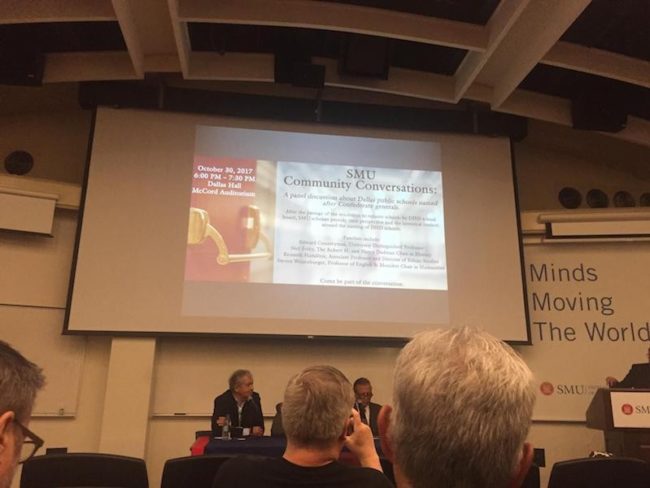
A panel discussion in McCord Auditorium Monday, Oct. 30 focused on the segregated history of public schools in Dallas and the need for Dallas to become a more united community.
“We need to keep having these conversations because it will only propel us forward as a nation,” graduate student and lecture attendee Jagia Khan said.
Panelists included Kenneth Hamilton, Associate Professor and Director of Ethnic Studies; Dr. Steven Weisenburger, Professor of English and Mossiker Chair in Humanities; Neil Foley, the Robert H. and Nancy Dedman Chair in History; and Ed Countrymen, University Distinguished Professor. All the panelists presented a short, five-minute speech about their personal relation to segregation and its impact on society.
Countrymen said he grew up in upstate New York and didn’t fully understand racism and the Confederacy.
“I remember my dad brought home Civil War toys, and I picked the Confederate flag because it looked cool,” Countrymen said. “So, that’s what I knew.”
Hamilton, a native of Wichita, Kansas, believes that Dallas has taken a longer time to move on from racism than other southern states.
“In the 1920s Dallas had the highest Ku Klux Klan membership in the South,” Hamilton said.
While Dallas desegregated its schools in the 1970s, several elementary schools are named after people associated with the Confederacy, including Stonewall Jackson and Robert E. Lee. Trustees have been discussing renaming the schools.
Neil Foley had three daughters who attended Robert E. Lee in Austin. After numerous meetings and forums with the school board and community, the Austin School District Advisory Committee changed its name to Russell E. Lee.
Foley posed three questions to the audience at the panel discussion when considering the generals that schools are named after: 1. Do they have local significance? 2. Do they honor our history? 3. Does the name have an educational background that students can learn about?
“The real question you have to ask yourself is, ‘What values do you want to your school to represent and what values do these heroes possess that you want your kids to have?’” Foley said.








